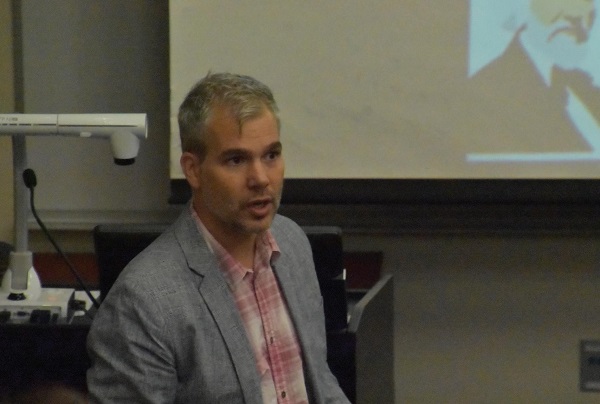
By Richard Mactough
Staff Writer
The Frederick Douglass Debate Society contested whether or not welfare improves the lives of Americans on Oct. 12.
The topic of the debate was inspired by issues from The Glass Castle by Jeannette Walls.
It was a scrimmage, practicing debate skills to compete against other colleges in the Pennsylvania State System of Higher Education (PASSHE) across 14 campuses.
Teams were randomly selected by Associate Professor of philosophy and religious studies, Dr. Storm Heter. He coaches The Frederick Douglas Debate Society.
Both sides were obligated to present either for or against welfare, despite their personal beliefs.
There was an affirmative team required to come up with arguments in support of welfare. The team was represented by Matteo Vilardi and Shelly Moyal.
The opposition team consisted of Jamee Haney and Chase Weiss. People in attendance were given a ballot, and voting for which team they believed argued the strongest.
The audience applauded the debaters in their first scrimmage.
“You are the judge, you have a ballot and you’ll decide the winner,” said Heter.
Both the affirmative and opposition had six minutes for opening speeches. There was also closing speeches of four minutes for each team.
Discussion about the book was held off until after the debate, avoiding prejudices made by judges.
Vilardi was given the role of the opening affirmative. He argued the opposing team believed students will not better themselves, but thought college students must know welfare recipients are doing the same to improve their lives.
He brought up conservative talking points such as welfare recipients are illegals and lazy. He discussed many are in need to survive.
He explained some were in need while working a part time job, and were still having trouble find a full time job.
“Taxes taken out of your checks are at least seven percent. So only seven percent of your taxes are given to keep beings afloat, and not drowning in economic hardship,” said Vilardi.
Vilardi asked the audience what they would do if their ancestors were in a time of need. He prayed the judges would reflect on themselves, and what they would do in a time of need.
Haney started her six minutes of the opening on the side of opposition. Americans taxes.
The opening opposition made by Haney, included points that money is taken from working men and given to non-working men.
Another argument Haney discussed was people on welfare become dependent on it. With welfare, you have a higher risk of dropping out [of school], said Haney.
Ten percent of welfare is misused or fraud.
She closed her argument with excerpts of the constitution, and that America is an independent nation. Haney asked why someone should have to worry about other families before themselves.
After five minutes of allowed preparation, Moyal started the affirmative closing statement. She started with the argument, taxes go to children born in to poverty.
“It’s unfair Americans are born into such harsh conditions,” Moyal said.
She continued explaining her argument that welfare recipients shouldn’t have to suffer because there are flaws in the system.
Moyal’s final statement was that welfare does improve the lives of Americans.
The opposition closing statement came from Weiss. He started by thanking everyone for coming to the scrimmage.
He complimented points made from the affirmative team.
Weiss argued welfare is a bad thing. He explained the only things needed for unemployment is for an individual to actively look for work, not at fault for losing a job and make less than 20 dollars a week. I could not look for work, act like I am looking for work and make unemployment welfare, said Weiss.
He argued studies released welfare affected an individual’s IQ because of their dependency. After the conclusion of the debate, both teams tied 9-9 in ballots.
The Frederick Douglass Debate society meets every Tuesday at 3 p.m. in the Science and Technology Center in room 137. Experience is not required.
Email Richard at:
rmactough@live.esu.edu

